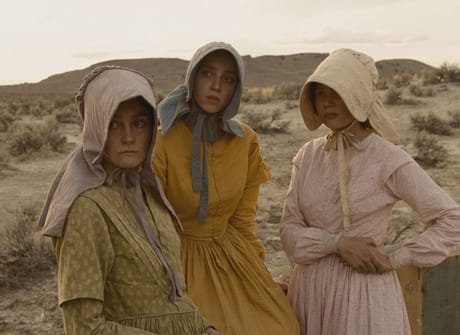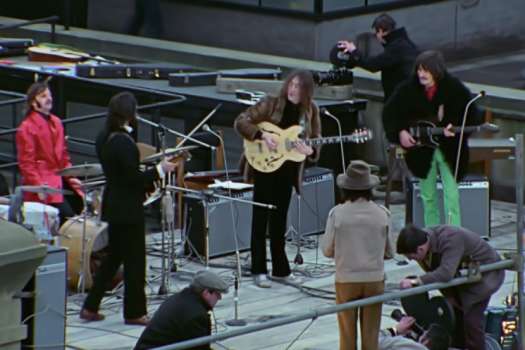With the sparse, barren, open terrain of the Oregon Trail in 1845 – cracked dirt, dusty and littered with dried-up logs and patches of dead grass – Meek's Cutoff portrays an intentionally spurious Western mythology, playing with archetypal notions of figures and relevance made moot by speculation and rational discernment. Proto-feminist heroines ambiguously emerge, along with conjecture about racism and the human relationship with an unforgiving environment, in what technically acts as a road movie without a starting point or a firm destination.
Covered in dirt and a full-face, scraggly beard, scowling storyteller Meek (Bruce Greenwood) leads three families of settlers across the Oregon desert. Only after an extended, and wordless, look at the daily routines of these bonneted ladies and ramshackle men, trudging along beside three covered wagons, do we learn of dwindling water supplies and a concern for the abilities, and legitimacy, of mountain man Meek.
At first, this strangely prescient parable seems grounded in survival, expanding on Reichardt's traditional thematic tendency to corner characters with bewildering plights that require difficult decisions. The question of turning back or having faith in their leadership mixes with a dash of gender politics when Meek tells Emily (Michelle Williams) that men are the ordered destruction to female chaos. Enervated, she quietly knits and blows him off.
A modern context arises when Thomas (Paul Dano) spots an Indian whom they resultantly capture and beat. Meek wants to kill the stranger, suggesting that Indians are little more than animals, while Thomas wants to barter with him for information. Emily is more curious about the stranger than anything, extending a bit of humanity in the middle of madness and, ultimately, taking on position of power within the group.
But how can they trust a stranger that doesn't speak their language? How can they know he won't lead them to slaughter? What is the nature of blind faith and reliance on our fellow humans we treat as enemies? Reichardt's film poses many questions and themes without succumbing to easy solutions.
More thoughtful and precise than the obvious description of "slow," Meek's Cutoff may be the accessible alternative to the similarly stylized Wendy & Lucy. It's hard to imagine not finding something to identify with in a parable that questions how we decide who to follow and when we should choose to think for ourselves.
(Thunderegg)Covered in dirt and a full-face, scraggly beard, scowling storyteller Meek (Bruce Greenwood) leads three families of settlers across the Oregon desert. Only after an extended, and wordless, look at the daily routines of these bonneted ladies and ramshackle men, trudging along beside three covered wagons, do we learn of dwindling water supplies and a concern for the abilities, and legitimacy, of mountain man Meek.
At first, this strangely prescient parable seems grounded in survival, expanding on Reichardt's traditional thematic tendency to corner characters with bewildering plights that require difficult decisions. The question of turning back or having faith in their leadership mixes with a dash of gender politics when Meek tells Emily (Michelle Williams) that men are the ordered destruction to female chaos. Enervated, she quietly knits and blows him off.
A modern context arises when Thomas (Paul Dano) spots an Indian whom they resultantly capture and beat. Meek wants to kill the stranger, suggesting that Indians are little more than animals, while Thomas wants to barter with him for information. Emily is more curious about the stranger than anything, extending a bit of humanity in the middle of madness and, ultimately, taking on position of power within the group.
But how can they trust a stranger that doesn't speak their language? How can they know he won't lead them to slaughter? What is the nature of blind faith and reliance on our fellow humans we treat as enemies? Reichardt's film poses many questions and themes without succumbing to easy solutions.
More thoughtful and precise than the obvious description of "slow," Meek's Cutoff may be the accessible alternative to the similarly stylized Wendy & Lucy. It's hard to imagine not finding something to identify with in a parable that questions how we decide who to follow and when we should choose to think for ourselves.




